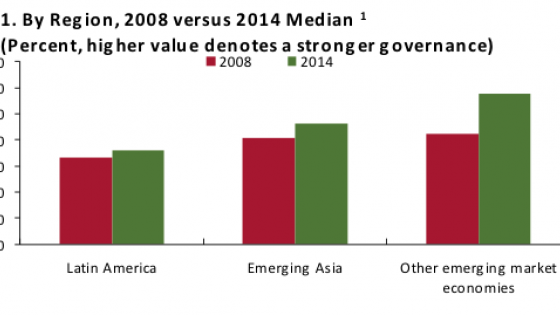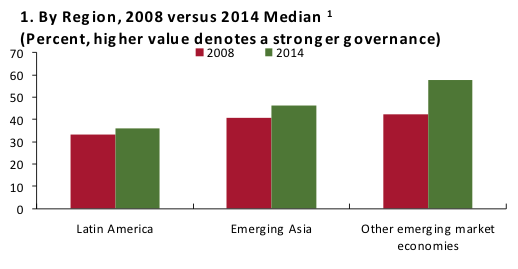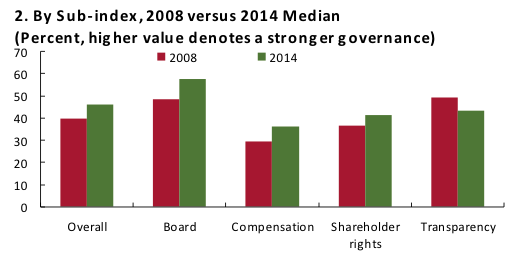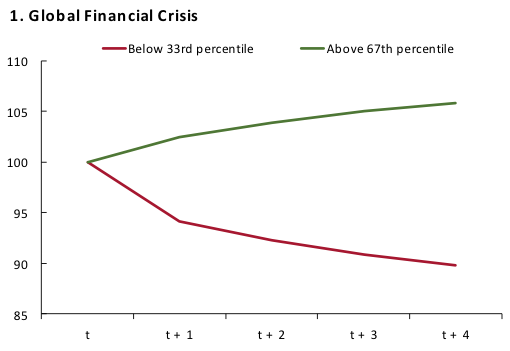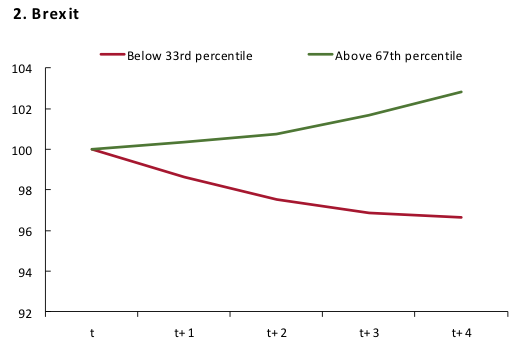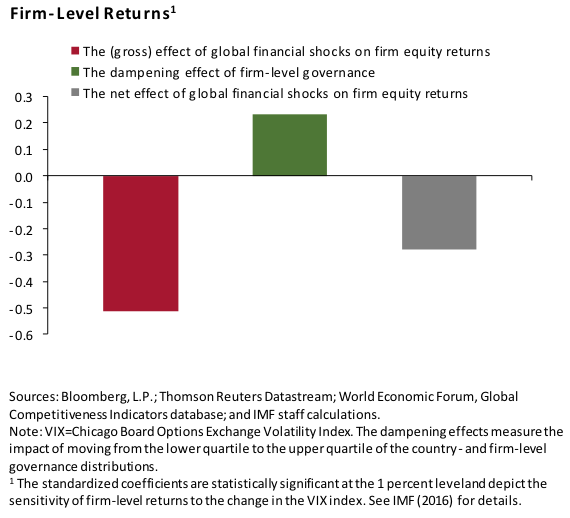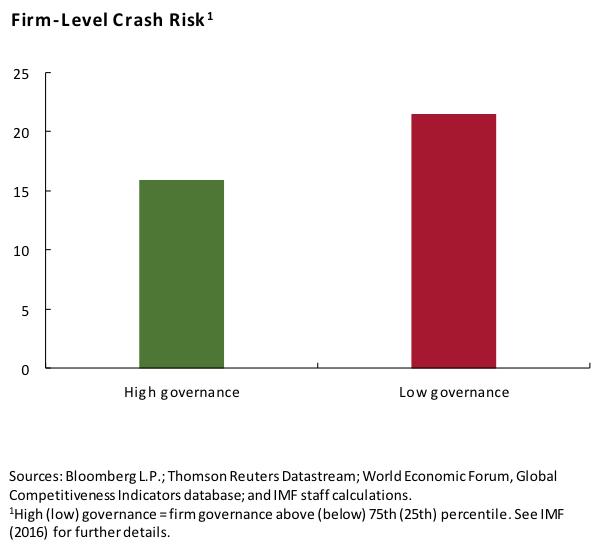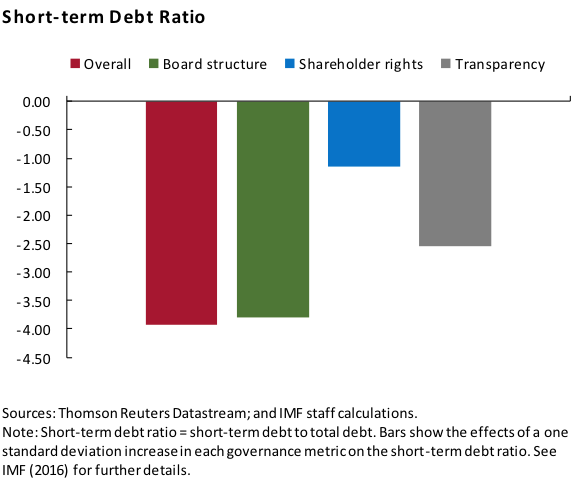Emerging market economies have become more financially integrated, granting them greater access to capital but also rendering them more exposed to global financial shocks. With this increased integration, questions arise as to whether institutional frameworks – including corporate governance – have improved accordingly, and helped emerging markets to be more resilient in the face of a more uncertain external environment.
In a recent study, we focus on the link between corporate governance and financial stability across emerging market economies (IMF 2016). Corporate governance deals with rules and practices which help ensure that the suppliers of finance to companies get a return on their investment (Shleifer and Vishny 1997). At the country level, it covers regulations – such as listing requirements – that govern equity investments in publicly listed firms. At the firm level, it entails the protection of minority shareholders, disclosure provisions, and practices, the role and structure of the board, and compensation structures.
Theory suggests that weak corporate governance can undermine financial stability by heightening vulnerability to external shocks:
- Governance deficiencies can allow corporate insiders to expropriate the assets of outside investors (creditors, minority shareholders). Johnson et al. (2000) argue that weaker corporate governance frameworks at the country level were associated with significantly more expropriation by managers during the Asian crisis, which in turn exacerbated net capital outflows and asset price collapses.
- Lack of corporate transparency may increase financial volatility. When global financial conditions are benign, investors are more likely to channel funds into companies and markets that feature higher returns but are less easy to understand (Brandão-Marques et al. 2013). During more turbulent times, these investors are likely to retrench first by reducing their exposure to these relatively opaque assets. As a result, less transparent markets may be more prone to boom-bust cycles.
- Outside investors may be willing to provide financing to weakly governed companies only at short maturities or high rates.
- Surprisingly, there is relatively scarce empirical research on the links between corporate governance and financial stability.
New firm-level corporate governance indices for emerging markets
We develop new firm-level indices of governance for a panel of emerging market economies, covering well over 600 listed firms across 25 emerging markets over 2008-2014.
It appears that governance across emerging market firms has generally improved in recent years (Figure 1). This improvement is seen across all major sectors (not shown) and for the sub-indices, with the exception of the transparency sub-index, which shows a decline. Country-level indices show similar trends.
Figure 1 Emerging market firm-level governance index
Sources: Thomson Reuters Datastream and IMF staff calculations.
Note: A higher value of the firm-level index denotes better governance. 1 Latin America includes Brazil, Chile and Mexico. Emerging Asia includes China, India, Indonesia, Korea, Malaysia and Thailand. Other emerging economies includes Poland, Russia, South Africa and Turkey.
Corporate governance and global financial shocks
Using the new firm-level index, we find that poorly governed firms experienced sharper equity price declines during episodes of market turmoil (Figure 2).
Figure 2 Event study: Firm-level governance and equity returns
(Index: t=100)
Sources: Bloomberg, LP. Tomas Reuters Datastream and IMF calculations.
Note: Indices were constructed using firm equity returns adjusted for the market return (adjusted returns are residuals from a capital asset pricing model). The Y-axis shows the equity market index, were 100 corresponds to the index one trading day before the event. Below 33rd percentile denotes firms in the bottom tertile of the firm-level governance index (overall index); above 67th percentile denotes firms in the top tertile of the firm-level governance index. T(time) = the daye before the event; t+1 = day of the event. The day of the event (t+1) + September 15, 2008 in panel 1; and June 24, 2016 in panel 2.
More formal analysis relating equity returns to measures of corporate governance and changes in the VIX (our main proxy for such global shocks) confirms these findings. Emerging market firms that safeguard the rights of shareholders to a greater extent tend to be less sensitive to global financial shocks (Figure 3). In fact, moving from the lower to the upper end of the firm-level governance indices reduces the impact of the VIX for emerging market firms by about 50% on average. We also obtain similar results at the aggregate level – the stock markets of better-governed economies are less sensitive to changes in global financial conditions.
Figure 3 Impact of global financial shocks on equity returns
(percentage points)
Firm-level governance and crash risk
By helping better align price movements with fundamentals, better governance can help lessen investor overreaction to negative shocks and thereby foster financial stability. More specifically, our analysis reveals that better governance is associated with lower stock price crash risk. For example, crashes can occur when insiders who conceal information about firm-level fundamentals are faced with absorbing too much firm-specific bad news and decide to give up, releasing the news (Jin and Myers 2006). At the market level, if investors cannot distinguish well between idiosyncratic and aggregate shocks, the risk that an idiosyncratic shock spreads to the market rises. Regression analysis confirms that emerging market firms with weaker governance are more prone to extreme stock price drops (Figure 4), and similar results hold at the country level.
Figure 4 Crash risk
(percent)
Governance and corporate fragility
Enhanced corporate governance can improve firm-level solvency indicators. In particular, higher values of various governance sub-indices are associated with lower short-term debt ratios (Figure 5). This suggests that even limited governance reforms (such as a greater share of independent directors) can enhance corporate solvency by, for example, reducing short-term debt ratios.
Figure 5 Firm-level governance and solvency
(percentage points)
Overall, the benefits of corporate governance enhancements extend beyond those of individual firms – they can bolster the resilience of emerging markets to global financial shocks, thereby strengthening the case for further reform.
Disclaimer: The views expressed here are those of the authors and should not be attributed to the IMF, its Executive Board, or its management.
References
Brandão-Marques, L, G Gelos and N Melgar (2013) “Country transparency and the global transmission of financial shocks”, IMF Working Paper 13/156, International Monetary Fund, Washington, DC.
International Monetary Fund (2016) “Corporate governance, investor protection, and financial stability in emerging markets”, Chapter 3 in Global Financial Stability Report (October), Washington, DC.
Jin, L, and S C Myers (2006) “R2 around the world: New theory and new tests”, Journal of Financial Economics, 79(2): 257–92.
Johnson, S, P Boone, A Breach and E Friedman (2000) “Corporate governance in the Asian Financial Crisis”, Journal of Financial Economics, 58(1–2): 141–86.
Shleifer, A and R W Vishny (1997) “A survey of corporate governance”, Journal of Finance, 52(2): 737–83.
